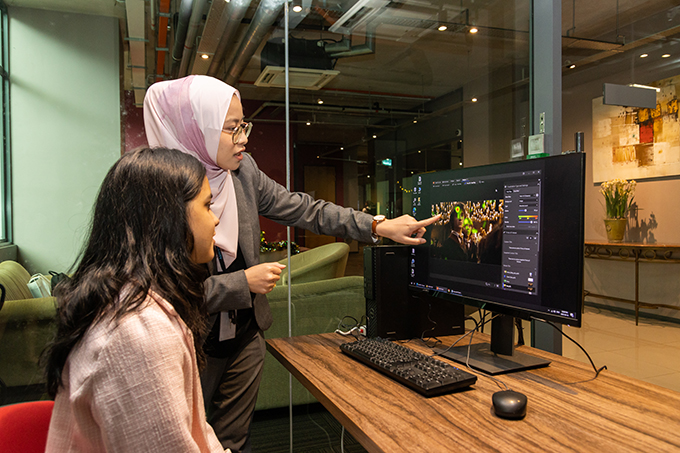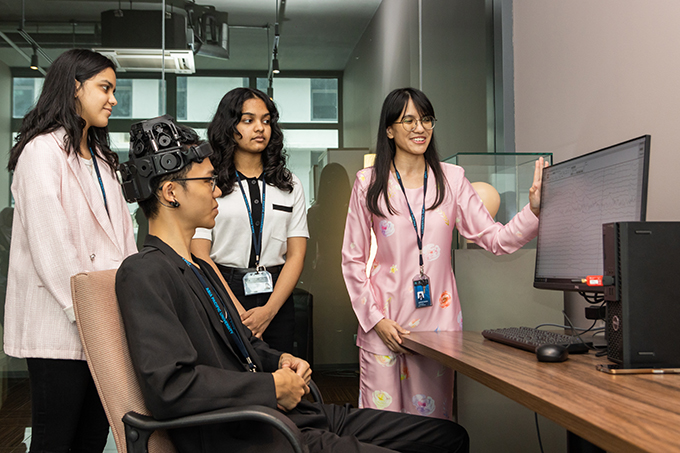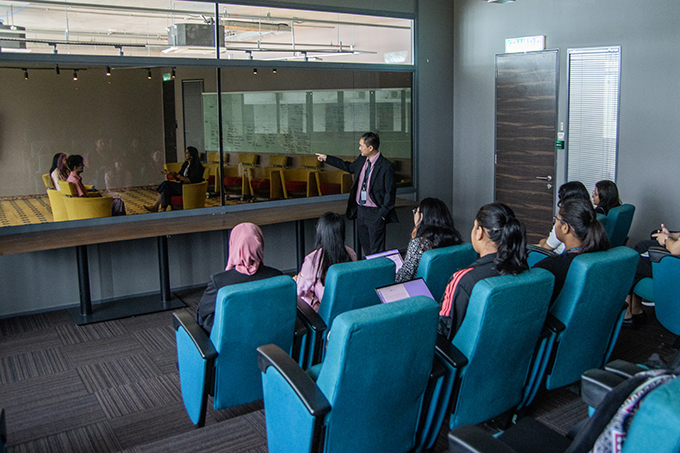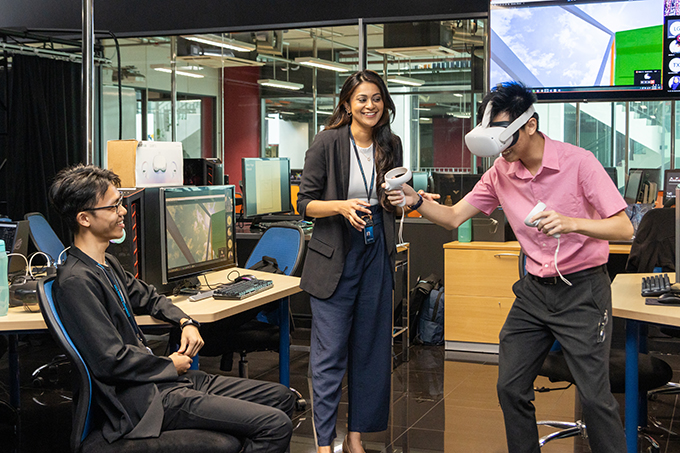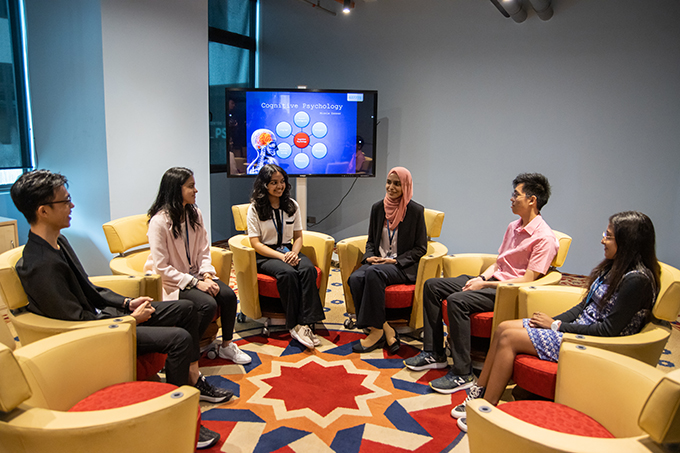You are here
Bachelor of Science (Honours) in Psychology
|
|
|
APU-DMU DUAL DEGREE PROGRAMME
|
ADMISSION REQUIREMENTS
| GENERAL REQUIREMENTS | |
| DIRECT ENTRY TO LEVEL 1 OF THE DEGREE: | |
| STPM | • 2 Passes in STPM with a minimum Grade C (GP 2.0), a Credit in Mathematics and Science/ Chemistry/ Physics/ Biology, and a Pass in English at SPM Level or its equivalent. |
| A-LEVEL | • 2 Passes in A-Level in any 2 subjects, a Credit in Mathematics and Science/ Chemistry/ Physics/ Biology, and a Pass in English at SPM/O-Level/IGCSE or its equivalent. |
| UEC | • 5 Grade B’s in UEC with a Credit in Mathematics and Science/ Chemistry/ Physics/ Biology, and a Pass in English at SPM/O-Level/IGCSE or its equivalent. |
| MATRICULATION/ FOUNDATION | • Passed Foundation programme (minimum CGPA of 2.0) with a Credit in Mathematics and Science/ Chemistry/ Physics/ Biology, and a Pass in English at SPM/O-Level/IGCSE or its equivalent. |
Note: Students without a Credit in Mathematics AND/OR a Credit in Biology/ Physics/ Chemistry/ General Science/ Applied Science at SPM/ IGCSE level or equivalent can be admitted but are required to attend special enhancement course(s) as Pre-Requisite. Students must obtain CREDIT in the Mathematics and Science enhancement courses at APU as a Pre-Requisite to related core courses taught in English. | |
| ENTRY TO LEVEL 2 OF THE DEGREE: | |
| DIPLOMA | • A Diploma and its equivalent with a minimum CGPA of 2.0 and a Credit in Mathematics and Science/Chemistry/Physics/Biology, and a Pass in English at SPM/O-Level/IGCSE or its equivalent.
|
Note: The credit requirement at SPM/IGCSE level can be waived should the grades obtained at the STPM/STAM/Diploma/Matriculation/Foundation level are equivalent/higher.
| ENGLISH REQUIREMENTS | |
INTERNATIONAL STUDENTS | • IELTS : 5.5 |
PROGRAMME OUTLINE
This programme is specifically designed to enable students to:
- Apply problem-solving, critical, analytical and scientific research skills to resolve complex, applied and unpredictable issues in the different areas of psychology.
- Perform a range of appropriate psychological measurements using software and technological tools.
- Relate ideas and research findings, both effectively and fluently, by written, oral and visual means.
- Identify a broad range of information, media and technological applications for psychological research.
- Demonstrate leadership in social settings, including understanding and communicating the role of evidence when making critical judgements about psychological issues and arguments.
- Demonstrate competence in problem solving and scientific research skills including generating research questions or hypotheses and devising ways of testing these using both quantitative and qualitative methods.
DEGREE LEVEL 1 |
Students will be equipped with knowledge about the theoretical and conceptual framework of psychology as a discipline. In addition, students will also be given a basic understanding of the practices and applications of psychology generally, and within the context of the mental health industry.
COMMON MODULES | |
|
|
SPECIALISED MODULES | |
|
|
DEGREE LEVEL 2 |
A broader range of skills will be learnt, enabling students to describe systematic knowledge of influences on psychological functioning, an understanding of the core areas of the discipline, and how they interrelate. They will be able to apply problem-solving, critical, analytical and scientific research skills to resolve complex applied and unpredictable issues in the different areas of psychology. They will also demonstrate leadership, professionalism and ethical behaviours in the field. The students will be nurtured to display sensitivity, and to react appropriately to contextual and interpersonal factors in social groups and teams, including working co-operatively, and responsibly to make contributions to team objectives.
COMMON MODULES | |
|
|
SPECIALISED MODULES | |
|
|
INTERNSHIP (16 WEEKS) |
Students will undertake an Internship/Industrial Training for a minimum period of 16 weeks to prepare them for a smooth transition from the classroom to the working environment.
DEGREE LEVEL 3 |
Students will make use of their previous studies and industrial experience to decide which areas of Psychology to specialise in for their final year elective modules. The students will be able to critically analyse and monitor their own learning as well as turn ideas into an action plan.
A final year project requires students to take a hands-on approach to different areas in psychology and to apply all the expertise and skills acquired from both the classroom and internship settings to their research project. They will also develop good skills in the use of media and technology for psychological research. The successful completion of the final year project is a testament of the student’s ability to combine psychological knowledge, communication skills, critical thinking and analytical skills to produce a personal achievement portfolio.
COMMON MODULES | |
|
|
SPECIALISED MODULES | |
|
|
ELECTIVE MODULES (CHOOSE 2) | |
|
|
MQA COMPULSORY SUBJECTS* |
|
|
(*All students are required to successfully complete these modules as stipulated by the Malaysian Qualification Agency.) | |
CAREER OPTIONS
|
|
ADVANTAGE OF APU PSYCHOLOGY PROGRAMME
Psychology is defined as the scientific study of behaviour and mental processes. Psychology looks at the person, the mind, thoughts, emotions and behaviour using scientific methods. As our society continues to progress with technology, it is evident that a large percentage of our lives are online - how technology influences our thoughts and behavior, and ultimately how it shapes us as individuals and as a society are key focus areas for human behaviour experts today.
As the modern society places more emphasis on mental health and psychological wellbeing, there is no better time for you to consider a career in psychology. You can explore careers in education, social services, human resources, training & consultancy, social science researcher, counterintelligence analyst, social media threat analyst etc.
As a graduate of the APU Bachelor of Science (Honours) in Psychology programme or the APU/DMU dual award Bachelor of Science (Honours) in Psychology programme, you will be equipped with knowledge from technology-infused psychology modules such as cyberpsychology, which is a scientific inter-disciplinary domain that focuses on the psychological phenomena which emerge because of human interaction with digital technology. Because here at APU we believe that in this digital era, a career in human mental health will require both the human touch like structuring of mental health assessments as well as technological know-how, using modern technology tools for psychology assessments and analysis. This will offer you a stronger edge in the modern and technology-driven world, in addition to the more conventional psychology teaching.
The Bachelor of Science (Honours) in Psychology programme is specifically designed to provide a solid understanding of psychology and its concepts in the contemporary environment for students to be able to articulate what they have learned as a human scientist. This three-year undergraduate programme will provide a clear understanding of the human mind, behaviour, and different types of personalities. This programme is offered as a Dual degree programme in partnership with De Montfort University (DMU) and is recognised both locally and internationally. |
PSYCHOLOGY FOR A DIGITAL WORLD
Digital Mental Health Tools

Social media is about sociology and psychology, more than technology - Brian Solis |
Science and technology multiply around us. To an increasing extent they dictate the languages in which we speak and think. Either we use those languages, or we remain mute. - J.G. Ballard |

BREAKING THE PSYCHOLOGY BARRIER
“Employment for all psychologists is expected to grow by 14% in the decade from 2016-2026, which is faster than average. ” - Bureau of Labor Statistics, US |
"Insufficient number of psychologists in Malaysia. The counsellor-to-individual ratio is 1:52,000 when the ratio should be 1:500." - Tan Sri Dato' Seri Dr. Noor Hisham, Director-General of Health Malaysia |
"There are not enough clinical psychologists to go around in Malaysia. If someone needs to see a mental health professional, the waiting period can be between eight months and a year.” - Dr Nur Anuar Abdul Muthalib, 2017, Vice President of Yayasan Hasanah |
WHAT IS DISTINCTIVE ABOUT THIS PROGRAMME?
The psychology programme at APU is designed to produce graduates who are ready for a career in the fields of psychology, with the added advantage of having specialized knowledge to accurately identify and utilize technology to aid the field of mental health and enable enhanced understanding of human behaviour. Students learn about how psychology is evolving through practical and theoretical understanding of human behaviour and mental health. The Psychology Centre is also equipped with high tech equipment and software that students have the advantage of using in practical lab sessions. |
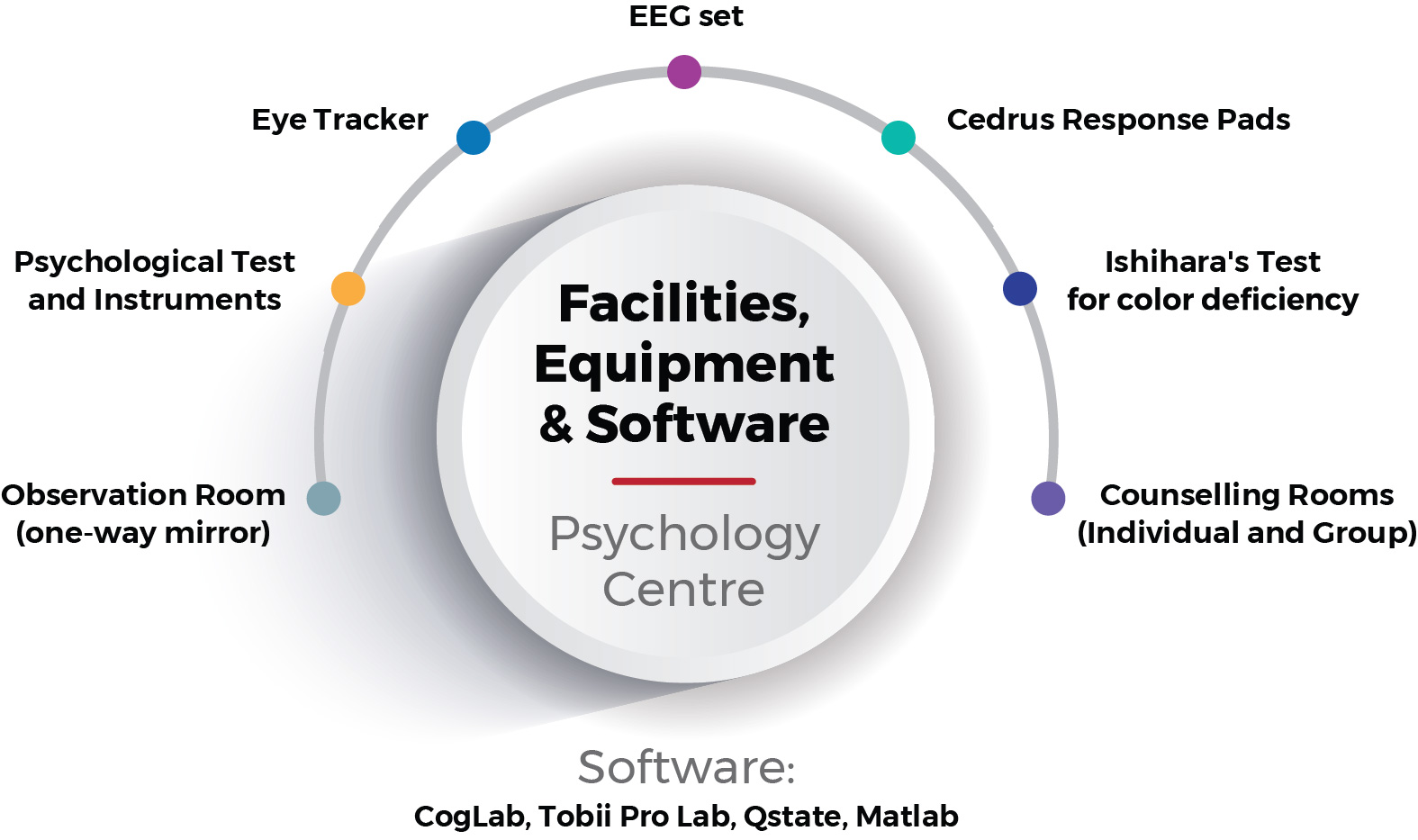
CENTRE FOR PSYCHOLOGY AND WELL-BEING AT APU | ||
| | |
| | |
In Malaysia, mental disorders estimated to be responsible for about 8.6% of total DALYs. National Health Morbidity Survey in 2015 reported the prevalence of mental health problem among adult and children were 29.2% and 12.1% respectively. The prevalence of suicidal attempt was apparently increasing. - Malaysian Mental Health Statistics |
USP for APU's Psychology Programme

COURSE FEES
Malaysian Students | International Students |
Year 1: RM 31,000 | Year 1: RM 32,000 (USD 7,270) |
* Fees stated here do not include Deposits and other Miscellaneous Fees. Please refer to Fee Guide for details.
MQA ACCREDITATION
(N/311/6/0116)(11/25)(MQA/FA14120) |
| All information is correct at the time of publication, but is subject to change in the interest of continuing improvement. |





